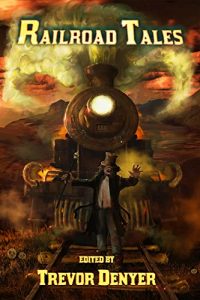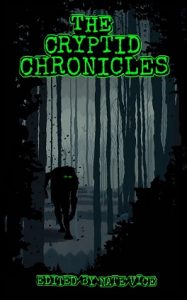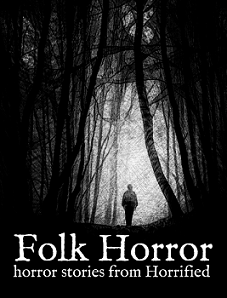
From wikipedia.org / Scottish National Portrait Gallery
Burns Night falls this evening, with – by my calculations – 264 years having now passed since the birth of Scotland’s greatest poet, Robert Burns. For many decades, January 25th witnessed one of the greatest ironies in Scottish culture. All over the country, schoolchildren would be made to memorise, then get up and recite Burns’ poems in front of their classmates and teachers. Those poems, of course, were written in the Scots language and thus were loaded with Scots vocabulary and grammar. However, any other day of the year, if a schoolkid had dared to speak Scots in the classroom, they’d have received a teacherly reprimand: “No, don’t speak like that. Speak proper English…”
Actually, a famous scene in William McIlvanney’s 1975 novel Docherty, where the hero’s son gets battered by a teacher at school for daring to utter the Scots word sheuch (meaning ‘gutter’ or ‘ditch’), seems sadly credible. At one time, speaking the language of Burns on a day that wasn’t Burns’ birthday was probably enough to get you belted in certain Scottish schools.
Anyway, here’s another slew of Scots words that I like – this time, starting with the letters ‘M’, ‘N’ and ‘O’.
Makar (n) – a poet or bard. In 2004, the Scottish Parliament established the post of ‘Scots Makar’, i.e., a national bard or poet laureate. Since then, the post has been occupied by Edwin Morgan, Liz Lochhead, Jackie Kay and, currently, Kathleen Jamie.
Malky (n/v) – a Glaswegian term meaning ‘a murder’ or ‘to murder’. Research tells me that malky was originally a nickname for a razor used as a weapon, and to malky someone was to slash them with such a razor. That said, the catchphrase of popular culture’s most famous depiction of Glaswegian crime and crime-fighting, “There’s been a murrr-der!” in the TV cop show Taggart (1983-2010), wouldn’t had the same impact if it’d been, “There’s been a malky!”
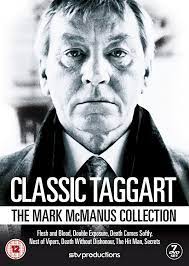
© STV Studios
Manse (n) – a manse is the house provided for a Church of Scotland minister, so basically it’s similar to a ‘rectory’ or ‘parsonage’. Someone who grew up in a manse, because their father (or mother) was a Church of Scotland minister, is known as a son or daughter of the manse. The Scottish Labour Party has, for some reason, given us several children of the manse, including former Prime Minister Gordon Brown, former Scottish Labour Party leader Wendy Alexander, and Wendy’s wee brother Douglas, a former cabinet minister. Political children of the manse inevitably cite their backgrounds as evidence of their strong ‘moral compasses’, though I have to say in my time I’ve met a few inhabitants of the manse (children and parents) whose moral compasses have gone a bit wonky, usually after a few glasses of whisky.
Mawkit (adj) – extremely dirty.
Merle (n) – a blackbird. I understand that merle is also the French word for ‘blackbird’, so presumably it’s another example of the linguistic legacy of the Auld Alliance that once existed between Scotland and France.
Messages (n) – shopping of the everyday variety, i.e., buying a few groceries rather than buying in bulk at Tesco or Sainsbury. Hence the common expression: “I’m daein’ ma messages!”
Midden (n) – a dunghill. A word often employed by Scottish parents while they complain about the condition of their teenage kids’ bedrooms. Also, at one point, the celebrated British sci-fi comic 2000 AD featured a character who was a Scottish bounty hunter with a gruesomely mutated visage. His name was Middenface MacNulty.
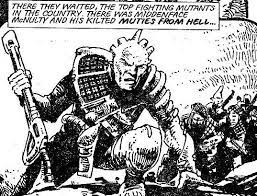
© Rebellion Developments
Mince (n) – nonsense. Hence such exclamations as “Och, ye’re talkin’ mince!” or “Yer heid’s fu ay mince!” or “See thon new Avatar movie? It’s mince!”
Ming (v) – to smell badly, with the present participle mingin’ used as adjective to mean ‘stinking’. As a result, when I was a kid and watched the old Flash Gordon serials (1936-40) on TV, I could help wondering if the villainous Ming the Merciless was so named because of his fearsome body odour. For a while, ming passed into popular usage all over Britain with a tweak in meaning, so that the word ‘minger’ became a common slang-term for describing someone who was ‘severely deficient in the looks department’. But I don’t hear it used much nowadays.
Mowdie (n) – a mole.
Muckle (adj) – very big. This adjective was immortalised in the much-loved children’s poem Crocodile by J.K. Annand, which begins: “When doukin’ in the River Nile / I met a muckle crocodile. / He flicked his tail, he blinked his ee, / Syne bared his ugsome teeth at me.”
Incidentally, here’s some pictures of a muckle crocodile I once met, at the side of the stairs going up to Shwedagon Pagoda in Yangon, Myanmar.
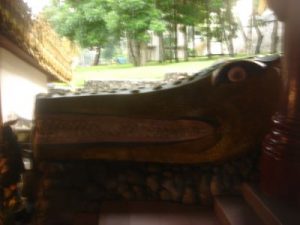

Neb (n) – a nose, beak or projecting point. Once upon a time, ladies of a certain age had to put up with uncomplimentary remarks about nebs whenever they played their Barry Manilow records on the household stereo.
Ned (n) – a young hooligan. Depending on which story you believe, the word ned was derived from the term ‘never-do-well’ or was an acronym for ‘Non-Educated Delinquent’. For a time in the early 2000s, it was ubiquitous in Scottish conversation, used as a label for any undesirable-looking youth with a penchant for wearing shell-suits, bling and Burberry-patterned caps and for swigging from bottles of Buckfast Tonic Wine. Its popularity was no doubt increased by the ‘neds’ sketches in the famous Scottish TV comedy show of the era, Chewin’ the Fat (1999-2005). Indeed, ned became the north-of-the-border equivalent of the word ‘chav’, used in England to describe ‘an anti-social lower-class youth dressed in sportswear’. Just as with ‘chav’, there were fears that ned was being used to demonise all young, working-class people. If I remember correctly, the Scottish Socialist Party MSP Rosie Kane tried to have the word banned from the Scottish parliament in 2003.
But before the controversy, I remember hearing the word ned as long ago as the early 1980s. Folk from Glasgow I knew would use it to describe anyone who was small, mouthy and annoying. In that way, it wasn’t much different from the abusive Scots term nyaff, which urbandictionary.com defines as “a very irritating person. When they come into the room, you want to leave.”
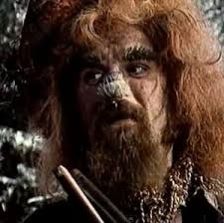
© Southern Television
Neep (n) – a turnip. That’s why in the 1970s kids’ TV show Wurzel Gummidge (1979-81), Billy Connolly played a turnip-headed Scottish scarecrow called ‘Bogle MacNeep’. Turnips and potatoes together on a plate are, of course, known as neeps an’ tatties. Meanwhile, my American partner assures me that whenever I talk about neeps an’ tatties, it sounds to her like I’m describing something extremely lewd and filthy. Goodness! (Or better still, jings!)
Neuk (n) – a corner, including one – i.e., a bend – in the coastline. The most famous geographical example is East Neuk in Fife.
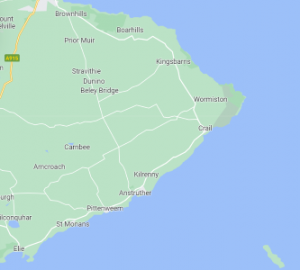
From maps.google.com
Nip (n) – a short, sharp measure of alcoholic spirits, often whisky, though I’ve heard people talk about ‘nips ay gin.’ I’d always assumed that, when describing a measure of whisky and the spiky, tingling effect it had when you downed it, nip was synonymous with jag. But looking online, I’ve seen claims that it comes from the word ‘nibble’, as if a nip is just a nibble at the cake that is the full whisky bottle. Also, I’ve seen it attributed to the archaic word ‘nipperkin’, which was ‘a unit of measurement of volume, equal to one-half of a quarter-gill, one-eighth of a gill, or one thirty-second of an English pint’.
Nippie sweetie (n) – an irritable, sharp-tongued person. This is usually applied to the female of the species. Disgruntled Scottish Conservatives, Liberal Democrats and Labourites frequently fling the term nippie sweetie at Scotland’s First Minister and leader of the Scottish National Party, Nicola Sturgeon.
Numpty (n) – a stupid person. To me, though, a numpty is more than that – it’s a preposterous, pompous person who is also stupid. In In the Loop (2009), the movie spin-off from the satirical TV show The Thick of It (2005-12), the preposterous, pompous politician played by Tom Hollander becomes a laughing stock when the wall of his constituency office endangers public safety by toppling over. Jamie MacDonald, the ferocious Motherwell-born spin doctor played by Paul Higgins, taunts him about ‘Wallgate’ by calling him ‘Humpty Numpty’. (To quote MacDonald in full: “If it isn’t Humpty Numpty, sitting on top of a collapsing wall like some clueless egg c*nt.”)

© BBC Films / UK Film Council / Optimum Releasing
Offski (adj) – ‘away’, ‘leaving’, ‘going’, as in the common Glaswegian phrase, “I’m offski!”
Orraman (n) – in agricultural communities, an orraman was an odd-jobbing farmhand who’d muck out sheds, dig holes, put up fences, mend drystane dykes, lug bales of hay around, drive tractors and basically do whatever needed doing at the time. Now, with farming heavily mechanised, and with one farmer on a tractor (towing the appropriate machine) capable of doing what it took half-a-dozen people to do a few decades ago, the days of the orraman are probably past.
Oxster (n) – an armpit. Dundonian poet Matthew Fitt deployed this word when he wrote the Scots-language translation of the 2013 Asterix-the-Gaul book, Asterix and the Picts. In the original French text, Asterix’s hulking sidekick Obelisk made a joke about ‘oysters’. Fitt converted it into a joke about oxsters / armpits to make it more Scottish-friendly. As you do.








